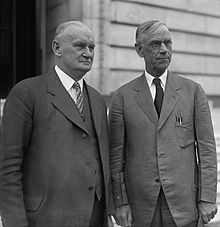Contents
Willis Chatman Hawley (May 5, 1864 – July 24, 1941) was an American politician and educator in the state of Oregon. A native of the state, he would serve as president of Willamette University in Salem, Oregon, where he earned his undergraduate and law degrees before entering politics. A Republican, he served as a member of the United States House of Representatives from Oregon from 1907 to 1933 where he co-sponsored the Smoot–Hawley Tariff Act in 1930.
Early life
Hawley was born on a farm in the old Belknap settlement near Monroe in Benton County, Oregon, on May 5, 1864.[1] After he attended country schools, he entered college. In 1884, he graduated with a bachelor of science degree from Willamette University in Salem, Oregon.[1] Hawley was the principal of the Umpqua Academy from 1884–86.[2] In 1888, he received a bachelor of arts degree from the school along with a Bachelor of Laws from the law department.[1]

Next, he served as president of the Oregon State Normal School at Drain south of Eugene from 1888–1891.[1] During this time he earned a master's degree from Willamette in 1890 and the following year joined the faculty at his alma mater.[1] Hawley became the president of Willamette, serving in that position from 1893 to 1902 while he was professor of history and economics for sixteen years at the school.[3]
Then, he engaged in a variety of business and educational ventures before entering politics.[3] Hawley became a member of the National Forest Reservation Commission and a member of the Special Committee on Rural Credits created by Congress in 1915.[3] Additionally, he served as a member of the Commission for the Celebration of the Two Hundredth Anniversary of the Birth of president and general George Washington.[3]
Politics
Hawley won Oregon's 1st Congressional District as a Republican in 1906.[3] He was then re-elected every two years to Congress for the next 12 sessions of Congress.[3] Hawley served in Washington, D.C., from March 4, 1907, until March 3, 1933.[3] While in Congress, he was chairman of the Committee on Ways and Means for the Seventieth and Seventy-first Congresses. Hawley was then a co-sponsor of the Smoot–Hawley Tariff in 1930, which raised import tariffs to record levels.[3]
Hawley was defeated in his bid for renomination to his House seat in 1932, and left office in March 1933.[3] He returned to Salem where he practiced law.[3] He died on July 24, 1941, at the age of 77 in Salem and was interred at that city's City View Cemetery.[3]
References
- ^ a b c d e Emory R. Johnson (July–December 1902). "Personal Notes". Annals of the American Academy of Political and Social Science. 20. Philadelphia: A.L. Hummel for the American Academy of Political and Social Science: 161.
- ^ "Oregon historical quarterly". 1900.
- ^ a b c d e f g h i j k "Hawley, Willis Chatman". Biographical Directory of the United States Congress. United States Congress. Retrieved 10 June 2010.



